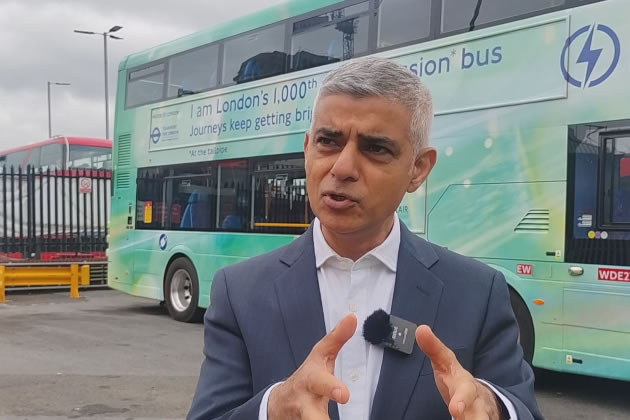Hounslow Sees Outer London's Biggest Fall in Bus Services
Kilometres travelled on local routes down 6% since Sadiq Khan became Mayor

Sadiq Khan had pledged to boost outer London bus services to offset ULEZ impact
September 20, 2023
Newly-obtained data has shone fresh light the extent to which bus services have been reduced in the borough of Hounslow over the last eight years.
It has seen the highest reduction in kilometres operated with a reduction of 6.1% matched only by the fall in Richmond upon Thames.
The fall is believed to be down to the curtailment of parts of some routes such as the 27 which ceased to serve the Chiswick area during this time and a general reduction in scheduling particularly in the post-pandemic period.
The data – requested by Green London Assembly member Siân Berry – looks at kilometres served per year between 2014/15, while Boris Johnson was still mayor, and 2022/23.
Outer London overall saw a 0.3% increase in kilometres operated, but Ms Berry pointed out that several suburban boroughs including Hounslow and Ealing, which saw a 3.3% cut, have individually suffered service reductions.
Brent, which saw a 5.8 per cent decrease, lost one million bus kilometres over the eight year period – the largest numerical total reduction of any outer London borough.
The biggest increase across Greater London was seen in Barking and Dagenham, which has enjoyed a 17.7% boost in bus kilometres over the period covered.
Statistics provided by mayor Sadiq Khan’s office show that Greater London has overall seen a six per cent reduction in kilometres travelled each year by buses across the capital. The heaviest service reductions have taken place in inner London, which overall saw a 13.8 per cent reduction in ‘bus kilometres’, according to an analysis of the data by City Hall Greens.
The worst affected inner borough in percentage terms was Westminster, which saw its bus kilometres slashed by 28.4 per cent over the period.
The mayor’s team blamed “Government [funding] cuts” and “the requirements of the recent short-term funding deal” struck between Transport for London (TfL) and the Department for Transport (DfT). It also pointed to the Superloop network of express buses in outer London, which is due for completion in the spring of next year.
Ms Berry particularly highlighted the statistics from outer London however, given commitments made by Mr Khan to improve public transport provision in tandem with the ULEZ) expansion.
Ms Berry said, “Outer Londoners heard the Mayor promise bus improvements. But when they find out they have actually endured a reduction in bus services, they will be so disappointed in him.
“[This data] illustrates how headline figures obscure the scale of the cuts in many outer London boroughs.
“London’s mayor must invest more into new bus services focused on areas that need it most, so that every Londoner has the support they need to navigate our city.”
Many of the bus reductions appear to have taken place at the end of the eight-year period, between 2021/22 and 2022/23 – as the capital emerged from the pandemic.
Every single London borough saw a decrease between those two years, with the exception of Newham, which had a relatively small increase of about 100,000 bus kilometres, and Kingston upon Thames, which remained at roughly the same level.
Responding to Ms Berry, a spokeswoman for Mr Khan said, “The Mayor has done everything in his powers to protect bus services across the capital, but Government cuts and the requirements of the recent short-term funding deal meant that some bus routes were cut in recent years.
“Despite this, Sadiq has stepped in and provided an additional £25 million every year to save the majority of bus routes that were proposed to be cut in central and inner London, and has committed to adding one million annual bus kilometres to outer London’s network.
“Crucially, the Mayor also announced the new Superloop which will transform travel in outer London, adding over four million extra kilometres to the bus network. TfL has added over one million annual bus kilometres to the network this year alone.”
She added, “Sadiq has also introduced the Hopper fare to make the bus network more affordable for millions of journeys, while investing in greening London’s bus fleet to make it one of the greenest in the world.”
A DfT spokesman said, “Transport in London is devolved to the Mayor who, as part of the £1.2 billion agreed by TfL last year, committed to providing Londoners with 25 kilometres of new bus lanes by 2025.”
The Government’s position is that the funding settlement agreed with TfL is sufficient to maintain services and invest in the future of the network.
Noah Vickers - Local Democracy Reporter